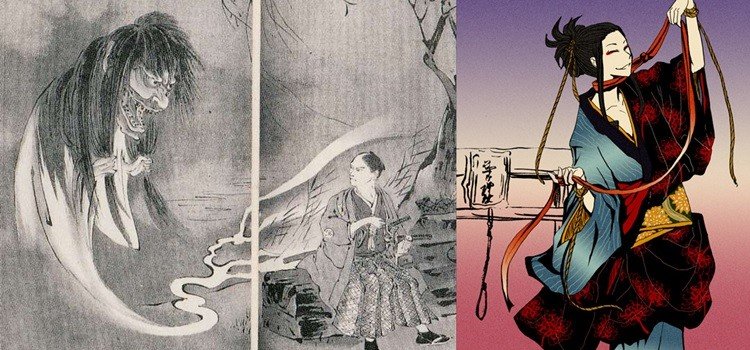Japanese folklore is full of supernatural creatures known as youkai (妖怪), each with its own peculiarity. Among stories of animated objects and playful spirits, there are youkai that personify humanity's deepest fears. One of these is Itsuki (縊鬼), a terrifying being that does not attack with physical violence but commands its victims to a tragic fate: suicide by hanging.
This legend, recorded during the Edo period, reveals not only the dark character of Itsuki but also the psychological and cultural impact it carries.

Table of Content
The recorded history of Itsuki
The first mention of Itsuki appears in a text from the Edo period called Notes on the Reversed Side of Drafts (反故の裏書). This work documents curious and supernatural events, including the encounter of a government official with this fearsome youkai.
According to the report, the officer called his subordinates for a meeting, but one of them arrived late and agitated. The man, behaving strangely, quickly announced:
“I won't be able to participate today. I left someone waiting!”
When asked who he was waiting for, he replied:
"I promised someone that I would hang myself."
The officer, suspicious, prevented the man from leaving and offered him alcohol to calm him down. During the conversation, he revealed that he had found a figure standing near the entrance portal, which ordered him to fulfill that macabre promise. Meanwhile, another piece of news arrived at the meeting: a person had hanged themselves exactly at the mentioned location, apparently fulfilling the fate that the subordinate had escaped.
This macabre event was attributed to Itsuki, a youkai whose main characteristic is inducing people to promise that they will commit suicide.
The psychological impact of Itsuki
What makes Itsuki so terrifying is the type of influence he exerts. Unlike other youkai that attack physically or play tricks, Itsuki explores the internal fears and psychological vulnerability of his victims. He doesn't need to force or directly manipulate; he just needs to make a suggestion and watch the tragic outcome unfold.
This coercive power deeply influences Japanese cultural beliefs about honor, duty, and the weight of promises. In the context of the time, when a person's word held great value, the impact of a youkai like Itsuki was even more disturbing.
Possible interpretation of the legend
Although there is no detailed physical description of Itsuki in historical records, he can be interpreted as a personification of fear and depression, themes that remain relevant in contemporary Japan. Suicide, especially ritualized suicide, has always been a sensitive topic in Japanese culture, often associated with honor and despair.
Itsuki could symbolize the internal struggle against external forces that seem uncontrollable, an allegory of how the environment and circumstances can lead someone to a dangerous mental state.
Why is Itsuki so scary?
Among so many youkai, Itsuki stands out for addressing deeply human issues: mind control and psychological vulnerability. Unlike physical creatures that can be confronted or avoided, Itsuki operates on the mental plane, where it is more difficult to defend oneself.
- Invisibility of danger: without a physical description, Itsuki can be interpreted as an invisible entity, which amplifies its threatening nature.
- Induction to the inevitable: the idea that your victims fulfill a "predestined" fate is particularly frightening, as it robs them of any sense of control.
- Link to suicide: In Japan, suicide by hanging has cultural and historical resonances, making Itsuki's power even more disturbing.
Itsuki in popular culture
Although Itsuki is not one of the youkai most portrayed in popular culture, it carries elements that make it a strong candidate for horror stories. The concept of mental coercion and fatalism has parallels in various narratives, especially in anime and films that explore the darker side of Japanese folklore.
Itsuki is an example of how youkai are not just folkloric creatures but also reflections of the fears, values, and cultural issues of their time. His story serves as a reminder of the importance of taking care of mental health and the impact that promises and external influences can have on people's lives.
And you? Have you heard of other youkai as dark as Itsuki? Share your stories or reflections!
